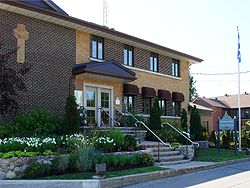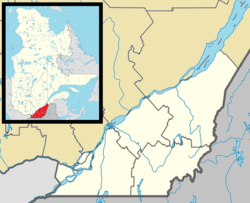Notre-Dame-de-l'Île-Perrot
Notre-Dame-de-l'Île-Perrot | |
|---|---|
 Town hall | |
 Location within Vaudreuil-Soulanges RCM | |
| Coordinates: 45°22′N 73°56′W / 45.367°N 73.933°W[1] | |
| Country | Canada |
| Province | Quebec |
| Region | Montérégie |
| RCM | Vaudreuil-Soulanges |
| Constituted | 14 April 1984 |
| Government | |
| • Mayor | Danie Deschênes |
| • Federal riding | Vaudreuil-Soulanges |
| • Prov. riding | Vaudreuil |
| Area | |
• Total | 65.60 km2 (25.33 sq mi) |
| • Land | 28.21 km2 (10.89 sq mi) |
| Population (2016)[4] | |
• Total | 10,654 |
| • Density | 377.6/km2 (978/sq mi) |
| • Pop 2016-2021 | |
| • Dwellings | 3,843 |
| Time zone | UTC−5 (EST) |
| • Summer (DST) | UTC−4 (EDT) |
| Postal code(s) | |
| Area code(s) | 514 and 438 |
| Highways | No major routes |
| Website | www |
Notre-Dame-de-l'Île-Perrot (French pronunciation: [nɔtʁə dam də lil pɛʁo]) is the largest of four municipalities located on Île Perrot, west of the island of Montreal, Quebec. The population as of the Canada 2016 Census was 10,654. It hosts the island's first church built in 1740 originally situated at Pointe-du-Moulin which was reconstituted as the Chapelle du Souvenir in 1953 beside the church of Sainte-Jeanne-de-Chantal across from the town hall.
History
[edit]The island was granted as a seigneury on October 29, 1672, to François-Marie Perrot (1644-1691), captain in the Picardy Regiment and governor of Montreal in 1670.[1]
In 1949, the Parish Municipality of Notre-Dame-de-l'Île-Perrot was formed out of the Parish Municipality of L'Île-Perrot.[1] A year later, it lost part of its territory when the Village Municipality of Pincourt was created.[5]
On December 18, 1986, the Town of Pointe-du-Moulin (founded in 1958) was amalgamated into Notre-Dame-de-l'Île-Perrot, which changed statutes from parish municipality to (regular) municipality in 1998, and became a ville in 2004.[1]
Demographics
[edit]| Year | Pop. | ±% |
|---|---|---|
| 1976 | 2,620 | — |
| 1981 | 3,228 | +23.2% |
| 1986 | 4,325 | +34.0% |
| 1991 | 5,372 | +24.2% |
| 1996 | 7,059 | +31.4% |
| 2001 | 8,546 | +21.1% |
| 2006 | 9,885 | +15.7% |
| 2011 | 10,620 | +7.4% |
| 2016 | 10,654 | +0.3% |
| Population amounts prior to 1985 are total of Notre-Dame-de-l'Île-Perrot (P) and Pointe-du-Moulin (V). Source: Statistics Canada[6] | ||
In the 2021 Census of Population conducted by Statistics Canada, Notre-Dame-de-l'Île-Perrot had a population of 11,427 living in 4,070 of its 4,156 total private dwellings, a change of 7.3% from its 2016 population of 10,654. With a land area of 28.06 km2 (10.83 sq mi), it had a population density of 407.2/km2 (1,054.7/sq mi) in 2021.[7]
| 2021 | 2016 | 2011 | |
|---|---|---|---|
| Population | 11,427 (+7.3% from 2016) | 10,654 (0.3% from 2011) | 10,620 (+7.4% from 2006) |
| Land area | 28.06 km2 (10.83 sq mi) | 28.21 km2 (10.89 sq mi) | 27.80 km2 (10.73 sq mi) |
| Population density | 407.3/km2 (1,055/sq mi) | 377.6/km2 (978/sq mi) | 382.1/km2 (990/sq mi) |
| Median age | 43.6 (M: 43.2, F: 44) | 42.3 (M: 42.7, F: 42.1) | 39.6 (M: 39.7, F: 39.6) |
| Private dwellings | 4,070 (total) | 3,843 (total) | 3,768 (total) |
| Median household income | $104,192 | $92,539 |
| Canada Census Mother Tongue - Notre-Dame-de-l'Île-Perrot, Quebec[6] | ||||||||||||||||||
|---|---|---|---|---|---|---|---|---|---|---|---|---|---|---|---|---|---|---|
| Census | Total | French
|
English
|
French & English
|
Other
| |||||||||||||
| Year | Responses | Count | Trend | Pop % | Count | Trend | Pop % | Count | Trend | Pop % | Count | Trend | Pop % | |||||
2016
|
10,640
|
6,570 | 61.75% | 2,310 | 21.71% | 210 | 1.97% | 1,380 | 12.96% | |||||||||
2011
|
10,455
|
6,890 | 65.90% | 2,230 | 21.33% | 235 | 2.25% | 1,100 | 10.52% | |||||||||
2006
|
9,865
|
7,035 | 71.31% | 1,980 | 20.07% | 150 | 1.52% | 700 | 7.10% | |||||||||
2001
|
8,530
|
6,375 | 74.74% | 1,525 | 17.88% | 125 | 1.46% | 505 | 5.92% | |||||||||
1996
|
7,020
|
5,375 | n/a | 76.57% | 1,245 | n/a | 17.73% | 105 | n/a | 1.50% | 295 | n/a | 4.20% | |||||
Local government
[edit]List of former mayors:
- Michel Tarte (2001–2005)
- Serge Roy (2005–2009)
- Marie-Claude Nichols (2009–2014)
- Danie Deschênes (2014–present)
Transportation
[edit]There is a shuttle bus service operated by CIT La Presqu'Île connecting to the Vaudreuil-Hudson commuter rail line.
Education
[edit]Commission Scolaire des Trois-Lacs operates Francophone schools.[13]
- École de la Samare
- École Notre-Dame-de-la-Garde
- Some areas are zoned to École La Perdriolle in L'Île-Perrot[14]
Lester B. Pearson School Board operates Anglophone schools. A part of the community is zoned to Dorset Elementary School in Baie-d'Urfé and another is zoned to Edgewater Elementary School and St. Patrick Elementary School in Pincourt.[15]
See also
[edit]References
[edit]- ^ a b c d "Banque de noms de lieux du Québec: Reference number 385496". toponymie.gouv.qc.ca (in French). Commission de toponymie du Québec.
- ^ a b "Ministère des Affaires municipales, des Régions et de l'Occupation du territoire: Notre-Dame-de-l'Île-Perrot". Archived from the original on 15 December 2013. Retrieved 11 March 2012.
- ^ "Parliament of Canada Federal Riding History: VAUDREUIL-SOULANGES (Quebec)". Archived from the original on 18 June 2009. Retrieved 23 March 2009.
- ^ a b 2016 Statistics Canada Census Profile: Notre-Dame-de-l'Île-Perrot, Quebec
- ^ "Pincourt". toponymie.gouv.qc.ca (in French). Commission de toponymie du Québec. Retrieved 9 November 2017.
- ^ a b 1996, 2001, 2006, 2011, 2016 census
- ^ "Population and dwelling counts: Canada, provinces and territories, and census subdivisions (municipalities), Quebec". Statistics Canada. 9 February 2022. Retrieved 29 August 2022.
- ^ "2021 Community Profiles". 2021 Canadian census. Statistics Canada. 4 February 2022. Retrieved 27 April 2022.
- ^ "2016 Community Profiles". 2016 Canadian census. Statistics Canada. 12 August 2021. Retrieved 9 November 2021.
- ^ "2011 Community Profiles". 2011 Canadian census. Statistics Canada. 21 March 2019. Retrieved 1 February 2014.
- ^ "2006 Community Profiles". 2006 Canadian census. Statistics Canada. 20 August 2019.
- ^ "2001 Community Profiles". 2001 Canadian census. Statistics Canada. 18 July 2021.
- ^ "Les écoles et les centres". Commission Scolaire des Trois-Lacs. Retrieved 18 January 2013.
- ^ "Liste des bassins desservis par les écoles en 2017-2018." Commission Scolaire des Trois-Lacs. Retrieved on 30 September 2017.
- ^ "School Board Map Archived 21 September 2017 at the Wayback Machine." Lester B. Pearson School Board. Retrieved on 28 September 2017.



